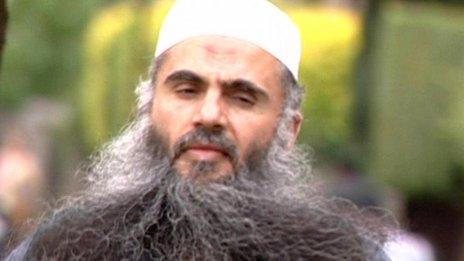Abu Qatada release from Long Lartin jail prompts debate
- Published
Abu Qatada was freed from the Worcestershire jail under strict bail conditions
Abu Qatada, accused of being one of the UK's most dangerous extremist preachers, has been released from Long Lartin top-security jail in Evesham.
He was seen hiding his face in the back of a van which left the Worcestershire jail at around 21:15 GMT.
The UK government says he is a threat to national security but has been blocked from deporting him to Jordan.
Lib Dem peer Lord Carlile said people's incredulity over the 51-year-old's release was "entirely justified".
Described by a Spanish judge as "spiritual head of the mujahideen in Britain" the UK authorities have previously said he gave advice to those who aimed "to engage in terrorist attacks, including suicide bombings".
The Muslim preacher has also featured in hate sermons found on videos in the flat of one of the 11 September bombers, and was convicted in his absence in Jordan of involvement in a terror plot.
A judge ended his six-year detention last week after the European Court of Human Rights (ECHR) banned him from being deported to Jordan.
The court blocked his deportation to Jordan, where he faces terror charges, saying evidence obtained by torture might be used against him there.
The UK and Jordan had previously reached agreement that he would not be tortured if he was deported.
Lord Carlile, the government's former independent reviewer of terrorism legislation, said: "It is extraordinary that this man should remain in the United Kingdom.
"We have to find a way of making him leave. There are legal, law of rule ways, of achieving that. It's just a pity it wasn't done before."
Abu Qatada was freed under strict bail conditions,, external including a 22-hour curfew that only allows him to leave home for a maximum of an hour twice a day. He has also been electronically tagged.
He is banned from attending a mosque, leading prayers, publishing any statement, or meeting any of 27 named individuals. Use of a mobile phone or the internet is also prohibited.
Under his strict curfew terms, the preacher will not be able to take his children to school as some reports had suggested.
The UK government must show significant progress towards deporting Abu Qatada within three months or his bail conditions could be lifted.
Downing Street said "all the options" for removing Abu Qatada from the UK were being considered.
"We will take all measures necessary to protect the public," said a No 10 spokesman on Monday.
"We are committed to removing him from the country. We want to see him deported."
But Labour's shadow home secretary Yvette Cooper said the government had not done all it could to stop Abu Qatada from being released from the high-security prison.
She said that the government should have appealed against the ECHR ruling, while pursuing urgent deportation negotiations with the Jordanian government.
"Instead the government did nothing, leaving a judge to decide there was little progress being made in deporting Qatada and that bail was the only option," she said.
UK Prime Minister David Cameron and King Abdullah of Jordan spoke by phone last Thursday and agreed to work on finding a "solution" to the case.
No 10 said Mr Cameron had explained the "frustration" that the ECHR ruling had caused.
"They agreed on the importance of finding an effective solution to this case, in the interests of both Britain and Jordan," a Downing Street spokesman said.
BBC home affairs editor Mark Easton said a Home Office delegation was heading to Jordan this week in the hope of getting assurances that would satisfy the ECHR.
Human rights
Tory MP Peter Bone said: "It cannot be right that a sovereign nation has someone who they think is an extremely dangerous individual who cannot possibly be allowed to stay in the country just because of the risk of his human rights.
"What about the human rights of all our citizens - our men and women and children?"
Abu Qatada has never been charged with a criminal offence in the UK but ministers have said he is "extremely dangerous".
Human rights campaigners have said that any prosecution should take place in the UK because of concerns over whether he would get a fair trial in Jordan.
Joel Bennathan QC, a leading defence barrister in counter-terrorism cases, said the preacher's case was similar to others where there had been allegations but no prosecution or conviction.
He said: "Any 'jihadi' who says anything that could conceivably be seen as encouraging violence tends to get arrested and charged with incitement to murder, racial or religious hatred.
"It is a fair guess that Abu Qatada has not done or said anything dangerous for years, if ever he did."
- Published26 June 2014

- Published13 February 2012
- Published9 February 2012

- Published8 February 2012

- Published6 February 2012
